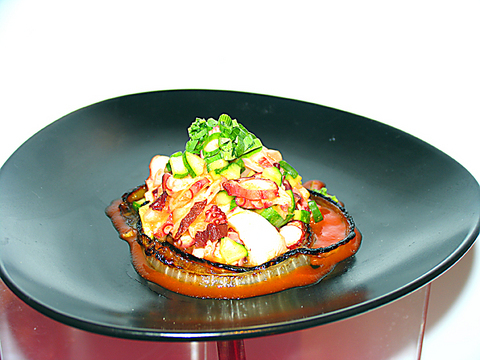Imagine fresh leis, tropical music, swaying hips, potted palm trees, video shots of pristine beaches and awesome waves, then add a long glass of the mocktail passion paradise and a meal dubbed "Hawaii: Allure from the Middle Pacific."
It can all be found at the Grand Formosa Regent Taipei which is holding a promotional event that shines a light on the cuisine and culture of the group of islands in the Pacific famed for grass skirts, colorful shirts and a dated detective show.
To help get you in the mood the first floor of the hotel has been transformed into a faux volcanic island paradise, complete with tropical flowers and singing birds, or rather eight young ladies from Hawaii who entertain diners with their hula dances at intervals during the day. Performance times for the dances are 2:15pm to 3pm, 4pm to 4:45pm, 7pm to 7:45pm and 8:45pm to 9:30pm.

PHOTO: JULES QUARTLY, TAIPEI TIMES
As for the food, it's as good as you might expect from a team of chefs brought in from the Four Seasons Resort Hualailai. All the ingredients for the dishes have also been flown in specially, so you get the authentic flavors of Hawaii, from the lauau (taro) leaf that is used to wrap one of the meat dishes, to the royal silver fish that is seared with limu kohu vinaigrette.
The set menu starter was luau. It was vaguely reminiscent of Thailand's tom kha gai without the lemon grass and is made from coconut milk, Maui onion, chicken and arugula. This was a good opener, but I was not so impressed with the Hawaiian fish, tomato and onion puree dish that came after, the pupuli martini. Maybe it was the lighting, but it looked purple and was obviously an acquired taste because few people on my table finished their servings.
Order was restored for the rest of the meal with a fine mauka of tenderloin and pineapple, macadamia nuts and olehu berries. It's always hard to find fault with a fresh fish as the main course and the set menu ended on another high note with a passion fruit and sweet milk shaved ice. Perfect food for a hot day. As to the ideal drink, choose from a list that includes mocktails such as kiwi encounter, mexapolitan and healthliner.
According to sous chef Ellis Victor Chong from the Four Seasons in Hawaii, food on the islands is special because there are so many ingredients that are only found there. He added the high quality of the constituents was also a factor.
"What we have prepared is a sample of what can be found on the islands. It is simple, cultural and light. A balance of tastes. It's fresh fish from the sea, vegetables and herbs from the gardens."

On April 26, The Lancet published a letter from two doctors at Taichung-based China Medical University Hospital (CMUH) warning that “Taiwan’s Health Care System is on the Brink of Collapse.” The authors said that “Years of policy inaction and mismanagement of resources have led to the National Health Insurance system operating under unsustainable conditions.” The pushback was immediate. Errors in the paper were quickly identified and publicized, to discredit the authors (the hospital apologized). CNA reported that CMUH said the letter described Taiwan in 2021 as having 62 nurses per 10,000 people, when the correct number was 78 nurses per 10,000

As we live longer, our risk of cognitive impairment is increasing. How can we delay the onset of symptoms? Do we have to give up every indulgence or can small changes make a difference? We asked neurologists for tips on how to keep our brains healthy for life. TAKE CARE OF YOUR HEALTH “All of the sensible things that apply to bodily health apply to brain health,” says Suzanne O’Sullivan, a consultant in neurology at the National Hospital for Neurology and Neurosurgery in London, and the author of The Age of Diagnosis. “When you’re 20, you can get away with absolute

May 5 to May 11 What started out as friction between Taiwanese students at Taichung First High School and a Japanese head cook escalated dramatically over the first two weeks of May 1927. It began on April 30 when the cook’s wife knew that lotus starch used in that night’s dinner had rat feces in it, but failed to inform staff until the meal was already prepared. The students believed that her silence was intentional, and filed a complaint. The school’s Japanese administrators sided with the cook’s family, dismissing the students as troublemakers and clamping down on their freedoms — with

As Donald Trump’s executive order in March led to the shuttering of Voice of America (VOA) — the global broadcaster whose roots date back to the fight against Nazi propaganda — he quickly attracted support from figures not used to aligning themselves with any US administration. Trump had ordered the US Agency for Global Media, the federal agency that funds VOA and other groups promoting independent journalism overseas, to be “eliminated to the maximum extent consistent with applicable law.” The decision suddenly halted programming in 49 languages to more than 425 million people. In Moscow, Margarita Simonyan, the hardline editor-in-chief of the